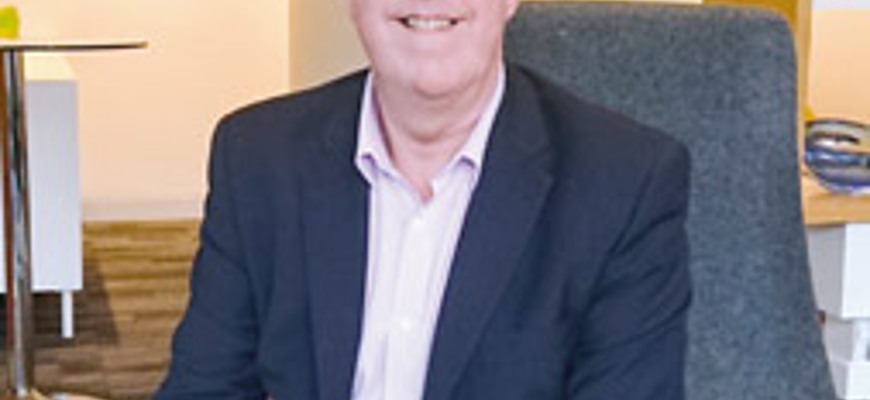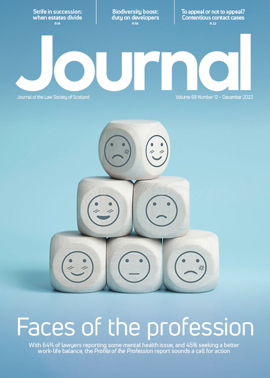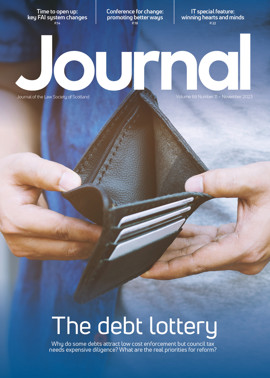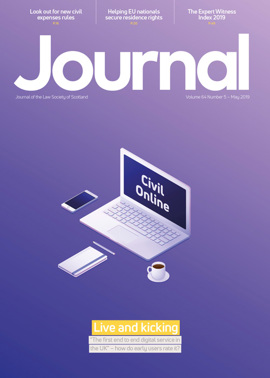Convener’s final bow

Where are you from and what has been your career path?
I was born, brought up and educated on the Southside of Glasgow. My school careers adviser suggested teaching or law, and I opted to study law at Dundee University. For the first year of the Diploma, I attended Strathclyde University; my Diploma supervisor was the late John Sinclair, and his son Euan later worked with me in Edinburgh.
Whilst a law student, I spent my summers working as a waiter in the Marine Hotel, North Berwick, a clerk in the Bank of Scotland, Charing Cross, and as a student in the procurator fiscal’s office, Hamilton.
I trained, qualified and gained my early PQE in boutique private practice firms in Glasgow. Seeking further career progression, I answered an advert for a mortgage legal vacancy with Standard Life in Edinburgh, and still have the newspaper cutting! I was interviewed by Colin Anderson, legal manager, moved east, and the rest is history.
Moving in-house, I worked in my first open plan office, left time recording behind, and became more involved in business decision-making. I turned my hand to mortgages, life assurance, reinsurance, IP and reputation management, social media and brand monitoring, website transparency and compliance, and commercial contract formation and management. I have also been involved in a demutualisation, several business disposals and brand refreshes, a merger, our first patent grant, domain name recoveries, trade mark hearings, and an appeal to an Appointed Person.
In June, I will have worked with Standard Life Assurance (part of Phoenix Group) for 31 years and been convener of the In-house Lawyers’ Committee for three years. At that point I will be leaving work and stepping down from the Society.
What did you most enjoy about your work?
I have worked with some amazing internal and external lawyers and other professionals, many of whom have become friends, and I have some very happy memories. The variety of in-house work has always been an attraction to me. With a creative streak and passion for communication, I relished editing our legal staff newsletters, proofreading our staff magazines, engaging with our marketing colleagues, and providing intranet IP guidance and tailored IP training sessions.
What have been the biggest changes during your time in-house?
I could highlight that tea trollies are a thing of the past, mobile phones have shrunk, letters have become like hen’s teeth, and everything is done online or by email. But more importantly, in the past going in-house was seen by some as a negative career move; now there is more of a two-way career path between private practice and in-house roles, and the variety of in-house options still intrigues me.
How did you become involved with the ILC? What have you been able to contribute?
I was asked to join the In-house Lawyers’ Group committee, which was independent of but supported by the Society, in 2012 by co-chairs Colin Anderson and Janet Hood. The ILG committee transferred to the Society’s new ILC in 2015, and when convener Lynda Towers stepped down, I threw my hat in the ring. I was elected by my in-house peers as ILC convener and co-opted Council member in July 2016, to lead and support the in-house community for the next three years.
Colin and the Vice Dean of the Faculty of Advocates, now Lord Malcolm, set up the Faculty’s annual 21st Century Bar conference in Edinburgh in 2000, for advocates and in-house lawyers. I have been involved in supporting and attending most of the conferences, and this event is now in its 19th year.
In 2008 I was involved in setting up the ILG’s first annual World IP Day conference in Edinburgh with Roisin Higgins QC. This became a standalone event organised by the Faculty and is now in its 12th year.
It has been an honour to serve as convener for our in-house broad church, which makes up about 30% of the profession, a proportion that is predicted to rise over the next few years. While only 12% of Scottish legal traineeships are in-house, we have to invest in our future, and the ILC will continue to promote in-house careers, traineeships and awards.
We have identified and recruited new ILC members to represent our public and private in-house sectors, and further ILC recruitment is underway as we try to ensure that the ILC is as representative of our diverse in-house legal community as possible.
The ILC has a very enthusiastic committee, including three very dedicated vice conveners and heads of our sub-groups, and a very efficient head of (Law Society of Scotland) member engagement for in-house lawyers. I leave the ILC in very rude health, having tried to listen and make a difference to our members, with a committee dedicated to ensuring our in-house profession is represented and receives tailored support.
Recent ILC achievements include providing regular Journal in-house content, increased social media engagement with our members, supporting the in-house annual conferences, the Society’s In-house Rising Star Award (now in its sixth year), the in-house best practice courses, the SOLAR annual conferences, the SYLA’s “So you want to be an in-house lawyer?” events, continuing our tailored in-house CPD programme, helping with in-house traineeship research, gathering in-house feedback on TCPD relevance, considering the position of sole in-house counsel, helping to produce the “Who is your client?” guidelines, and running the popular in-house round table discussion groups, with great feedback received.
I was delighted to join the judging panel of the Scottish Legal Awards, work with Janet again, and present some in-house awards. The finalists and awards events are networking nirvana, and I am really pleased that there are now three in-house award categories.
In addition I am a keen supporter of the Edinburgh and Glasgow Legal Walks, having participated on the Edinburgh walk for several years. They are great fun for a super cause, the Access to Justice Foundation.
I am really looking forward to chairing our flagship in-house annual conference 2019 on 13 June in Edinburgh, which we expect to sell out. With a wide range of sessions delivering on key themes of “collaborate, respond and innovate”, the programme includes black letter law updates on contracts, employment and data protection. We will also hear from in-house peers at panel sessions focusing on legal technology and demonstrating value as in-house counsel. The closing keynote comes from the Legal Business Rising Star In-house Counsel of 2019, Frances Coats. To top it all off, there will be a closing drinks reception, at which will be presented this year’s In-house Rising Star Award. There is a wonderful wealth of talent among the next generation of our in-house profession and it is a privilege and pleasure to be able to celebrate it.
How have you been involved with the wider profession and other professionals?
I have worked with some amazing lawyers, professionals, Society staff and office bearers, and it has been a privilege to have been a co-opted member of Council.
As a profession, we need to be aware of what is happening outside our sphere of influence. I have been involved in some of the outreach initiatives with other in-house lawyers abroad and, through the Society joining In-house Counsel Worldwide, have met many new in-house colleagues and friends at ICW events. We really do share common in-house challenges and opportunities, and it is a small world.
Before becoming convener, I was a board member of the Friends of the Royal Scottish Academy (and Friends’ trip leader to Vienna and Stockholm), vice convener of the Society’s Technology Subcommittee, a member of the IP Subcommittee and a member of the IP specialist accreditation panel.
What are the defining characteristics of an in-house lawyer for you?
In-house lawyers need to know their business, add value and offer options. In addition, they should try to become part of the decision-making process, be adaptable, and concentrate on what is important for their organisation.
What career advice can you offer for young lawyers who want to start an in-house career?
A mentor is a must, and you need to focus on what is important to you and stand out from the in-house crowd. You also need to gain relevant experience, make informed career decisions, and build your network connections. Consider volunteering to gain other exposure in and outside of law.
What are your own plans now? What keeps you busy outside the office?
I intend to keep busy and explore new volunteering options. Outside the office, I enjoy travel, theatre, photography, museums and galleries. I am really looking forward to this year’s Edinburgh Festival, and more long-haul travel beckons!
What is your most unusual/amusing work experience?
I attended a very busy “taking silk” party in London many years ago, and didn’t anticipate that by the end of the night my pockets were stuffed with business cards from virtually all the private practice lawyers present, all looking for referrals!
What would you take with you to a desert island, and what would you send to room 101?
A solar-powered and pre-loaded Kindle would help to pass the time on a desert island, and I would send online feedback forms to room 101.
There’s a lot to look forward to in law and there will always be a demand for lawyers. I wish my colleagues and friends, the ILC, the new ILC convener or co-conveners, the Scottish legal profession and the Society all the very best for the future.
In this issue
- Claiming under the advance payment scheme
- Time for a written constitution
- New form F9: worth the wait?
- Wedded to a matrimonial property regime
- Brexit divorce set to increase UK's “skype families”
- Corporate personality: Justice v Doctrine
- Reading for pleasure
- The Law Society of Scotland Expert Witness Index 2019
- Opinion: Judith Robertson
- Book reviews
- Profile: Michael Clancy
- President's column
- Is your legal data being held to ransom?
- People on the move
- Sign up – log in – action!
- Frozen out?
- Taxing times for litigators
- DNA analysis: when research just isn’t enough
- Brexit focus: EU citizen settlement remedies
- Why employers should report on wellbeing
- 3% – and then what?
- 1,000 days of mediation
- Barred from acting
- To name or not to name?
- Enter the “What I Think”
- Fixed penalties and fair trials
- Auto-enrolment: keeping employers on their toes
- Scottish Solicitors' Discipline Tribunal
- Vulnerable accused: a need for knowledge
- Burdens and who can enforce them
- Convener’s final bow
- Public policy highlights
- TCSP review update
- Westminster: answering the call
- Accredited paralegal practice area highlight: family law
- Accredited Paralegal Committee profile
- Nyona named star paralegal
- Ask Ash
- Moving nightmares part 2
- Complaints: seeking consistent practice
- Morally bankrupt?
- For the elderly: how SFE works
- Standing up to challenge






